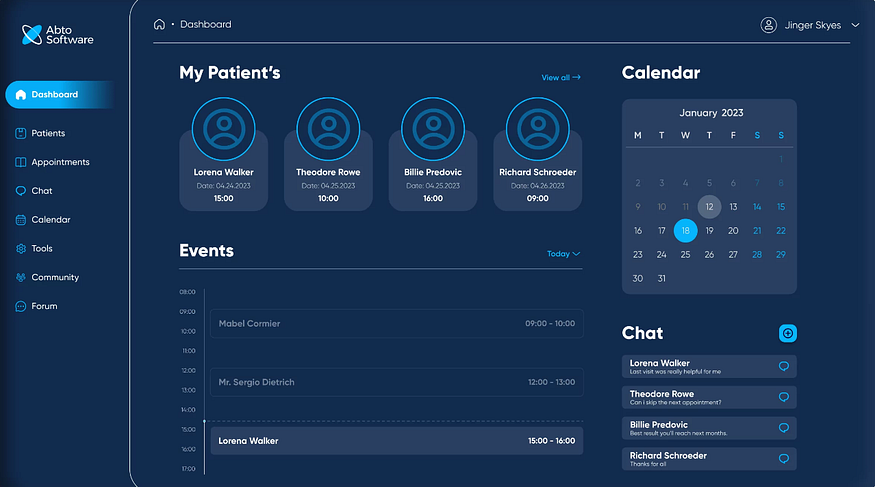Enterprise resource planning software is a centralized system that integrates various core business operations. It enables efficient management of accounting, human resources, supply chain, inventory, sales, and other business processes, which affect overall productivity.
Within one of our successful projects, Abto Software delivered an ERP platform for a healthcare provider, which facilitated strategic planning and optimization, appointment management, patient-doctor interaction, and other integral processes.
Key benefits healthcare providers typically leverage when using ERP software:
Improved operations and efficiency
Standardized processes and workflows
Data visibility
Data-driven decision-making
The challenges healthcare providers can overcome by using ERP systems:
Disconnected operations
Manual processes and paperwork
Data inconsistency
Uninformed decisions and difficulty in managing resource allocation
Quick overview of the delivered project
Our company entered the promising partnership to deliver a tailored enterprise resource planning solution. After being successfully integrated, the delivered ERP system now facilitates trusted and certified patient care.
Our engineers came up with an efficient solution that allows to find the best time & cost option to commute. The mechanism of optimized appointment management is based on both the professional’s and patient’s current location.
ERP platform for US-based healthcare provider
The custom-designed ERP platform comprises the following functionality:
Business planning and optimization — the solutions can assist the personnel with access to resources and reports to drive data-driven decision-making
Appointment management — the system notably simplifies appointment scheduling and management, which minimizes both time and cost for the healthcare facility and patient
Patient-doctor interaction — the ERP is equipped with tools, which improve patient-doctor interaction, for example, by sending appointment reminders
Patient segmentation — the ERP also provides CRM features, which enhances patient segmentation through location
Risk management — the platform allows the client company to improve risk detection, which prevents serious issues
Medical records — the platform collects and stores information about patients patient, which provides instant access to sources such as medical records, appointment history, risk category, and more
Data protection — the solution is built to ensure role-based access
Payment management — the system is designed to simplify payment handling, no matter the type
The robust and scalable ERP platform also includes third-party services:
Google maps
EDI Clearinghouse
Payment methods
Communication channels

Our approach and contribution: The stages we covered
Our engineers have used the already implemented software as the software’s prototype, but introduced significant changes to deliver a functional ERP platform.
Our team has covered:
- Architecture refactoring
By leveraging our knowledge and experience, we refactored the existing database architecture to support overall performance.
2. CI/CD setup
Our skilled DevOps specialists quickly covered CI/CD setup and optimization, helped with server configuration, as well as well-aligned infrastructure design.
3. Quality assurance and automation
With expertise in delivering healthcare products, we covered:
Quality assurance and automation
API integration
Automated test using different tracking tools
Automated tests’ integration with CI/CD processes
4. Data warehousing
Having expertise in designing data warehouses, we focused on empowering advanced reporting and analytics — the delivered data warehouse performs regular data download into the main database and supports straightforward reporting and analytics, driving more informed decisions.
The challenges and outcomes: The value we delivered
To ensure smooth operation, our engineers had to handle the following challenges:
- Database refactoring: Coupling challenges
To handle database refactoring when optimizing the custom-designed enterprise resource planning platform, we had to be very careful with the previous dependencies and information in the database implemented.
- Payment handling: Integration challenges
To protect both the customer and transaction information while establishing 100% secure online transactions, we had to adhere to acknowledged privacy regulations when covering integration processes.
Security precautions
HIPAA compliance
After partnering with the involved specialists, our client has obtained:
Notably improved business planning & optimization, appointment scheduling, customer interaction
Sensibly enhanced internal communication and collaboration between departments
Better usability, responsive design
More scalability
Summing up
By implementing ERP software, healthcare organizations can manage and automate inefficient operations. From finance, human resources, supply chain, and day-to-day customer support, to online payment handling, ERP systems quickly optimize routine processes, facilitating productivity and profitability.
In brief, a well-designed ERP platform might provide:
Accelerated operations across departments
Streamlined processes and workflows, which eliminate employee burnout
Data consistency
Regulatory compliance
Advanced reporting and analytics
Patient satisfaction and retainment
